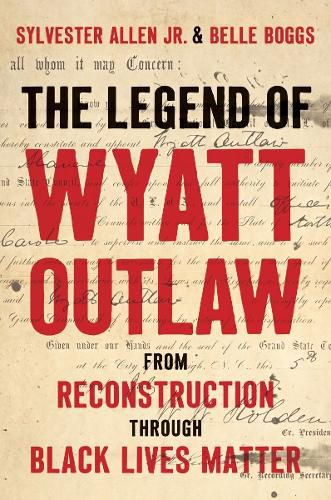Readings Newsletter
Become a Readings Member to make your shopping experience even easier.
Sign in or sign up for free!
You’re not far away from qualifying for FREE standard shipping within Australia
You’ve qualified for FREE standard shipping within Australia
The cart is loading…






Wyatt Outlaw's story was one of Black success: He was a Union League leader, business owner, and the first Black town constable and commissioner in Graham, a small town located in North Carolina's Alamance County. But in 1870, Outlaw was murdered by the Ku Klux Klan, setting off a dramatic series of events: more lynchings, a Republican-led "war" against the Klan, and a white supremacist crackdown on Black political power that continues today. As a child, Black activist, musician, and Graham native Sylvester Allen frequently passed the site where Outlaw was killed without ever learning his name. Belle Boggs, white and also from the South, taught high school in Alamance County without knowing Outlaw's importance.
Allen and Boggs both sought to discover why Outlaw had been erased from mainstream history books. In The Legend of Wyatt Outlaw, they share what they found in artful detail and connect Outlaw's story to the violence against Black people in Alamance and throughout the United States, from Reconstruction through Jim Crow, the civil rights era, and Black Lives Matter. Drawing on archival research, interviews, and their own personal stories, Allen and Boggs join the conversation begun by historian Peniel Joseph and activist William Barber II about a third Reconstruction in America, but they also offer ways to move forward for any community struggling with a history of racism.
$9.00 standard shipping within Australia
FREE standard shipping within Australia for orders over $100.00
Express & International shipping calculated at checkout
Wyatt Outlaw's story was one of Black success: He was a Union League leader, business owner, and the first Black town constable and commissioner in Graham, a small town located in North Carolina's Alamance County. But in 1870, Outlaw was murdered by the Ku Klux Klan, setting off a dramatic series of events: more lynchings, a Republican-led "war" against the Klan, and a white supremacist crackdown on Black political power that continues today. As a child, Black activist, musician, and Graham native Sylvester Allen frequently passed the site where Outlaw was killed without ever learning his name. Belle Boggs, white and also from the South, taught high school in Alamance County without knowing Outlaw's importance.
Allen and Boggs both sought to discover why Outlaw had been erased from mainstream history books. In The Legend of Wyatt Outlaw, they share what they found in artful detail and connect Outlaw's story to the violence against Black people in Alamance and throughout the United States, from Reconstruction through Jim Crow, the civil rights era, and Black Lives Matter. Drawing on archival research, interviews, and their own personal stories, Allen and Boggs join the conversation begun by historian Peniel Joseph and activist William Barber II about a third Reconstruction in America, but they also offer ways to move forward for any community struggling with a history of racism.